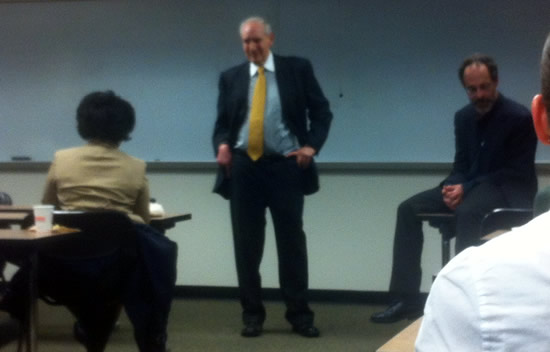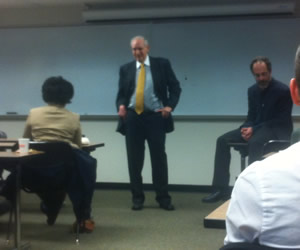This past Friday, I had the privilege of hearing Dr. William Freehling deliver the keynote lecture at the 18th Annual James A. Barnes Conference, at Temple University in Philadelphia. Freehling has written much about the Civil War, but now he is taking on an effort to write a Lincoln biography. Given that Lincoln’s life is heavily treaded ground, he focused his lecture on why he would even attempt such a work.

Freehling started by tracing his evolution in thinking about history. Initially, he scoffed at the “great man” theory and contingencies, instead focusing heavily on societies. However, he came to believe that a single man could make a difference. As for contingencies, Freehling told a personal story of how a mishap during his own birth resulted in partial paralysis, forever altering his life. Had it not happened, he is convinced he would have pursued a career that required the use of both his hands instead of history.
As for Lincoln, Freehling recalled several stories including surviving a horse kick at age 7. Then there was the decision to move to Illinois, which gave Lincoln the path of fighting Stephen Douglas for years, a man that Lincoln dogged at every opportunity, eventually gaining recognition through their famous debates. Freehling stated, “The little things matter and if you’re going to be a professional historian, you have to understand that.” Remarkably, “readers instinctively know that contingency matters, but historian don’t.”
Why Lincoln?
Freehling provided several reasons as to why we need another biography on Lincoln. The most compelling is that “it is absolutely untrue that there is nothing new to say about Lincoln.” Just what are some of those new things? First, Freehling believes historians have glossed over the warts of Lincoln far too much, including his support of the amendment to protect slavery. Second, Freehling believes there are other instances that reveal Lincoln was “an anti-slavery man scared to death of anti-slavery.” Yet, biographies do not readily reveal this concept.
Freehling also felt that Lincoln’s life was a series of failures until he reached the White House where he became our “greatest president.” How does a perpetual loser become such a sensation? Freehling aims to tell that story.
The most interesting theory came on Lincoln’s support for Union. As Lincoln strove to bring the Illinois resources into the United States economy, he came to see Union as the key to bringing economic access through railroads and rivers. Lincoln hated the idea of slavery, because it threatened the benefits of economic Union. The idea of secession was so abhorrent to Lincoln because it threatened the very Union that made Illinois an economic success.
Freehling admitted that his effort is a work in progress and that some of his ideas were still controversial among other historians (e.g., Lincoln supporting African colonization for blacks late in the war).
The talk was engaging and entertaining. The audience asked numerous questions and it was clear that people were thinking about Lincoln. Freehling is searching for new and fresh questions on a well-treaded topic and that is something always good to see in history.

